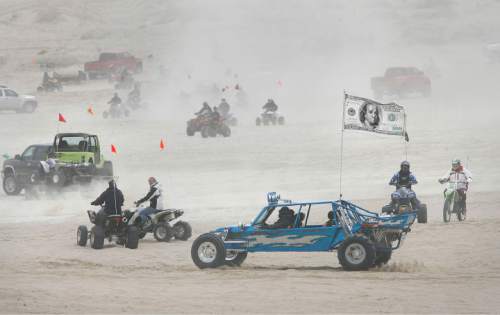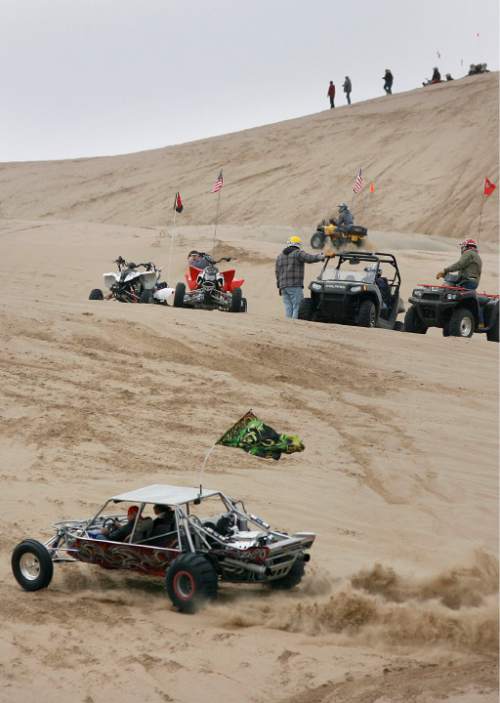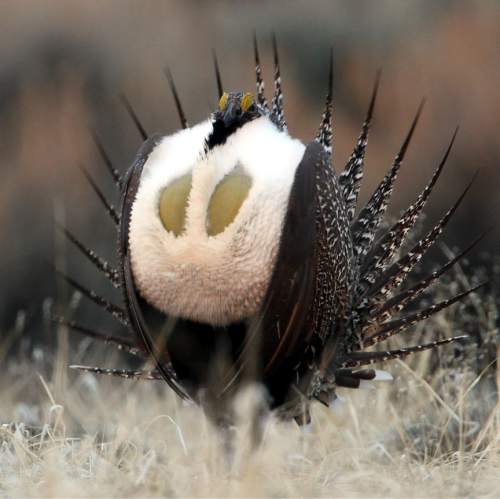This is an archived article that was published on sltrib.com in 2015, and information in the article may be outdated. It is provided only for personal research purposes and may not be reprinted.
Utah lawmakers were good to consultants this year.
Legislation passed this session will release a deluge of taxpayer dollars — more than $12 million — for state leaders' campaign against the federal government, aimed at taking over public lands and extracting the natural resources they hold.
New appropriations offer a bonanza for consultants retained to pressure Congress, sway public opinion, sue the federal government, intervene in environmental lawsuits, craft legal strategies, challenge federal scientists and develop land-use plans.
And private contractors are the beneficiaries of the legislative war chest — the economists, planners, range-management advisers, soil scientists, hydrologists and, of course, the lobbyists and lawyers who will be hired to provide the white papers to back up Utah's plans.
Some will boost familiar battles over 12,000 "RS 2477" roads and Utah's demand for title to 31 million acres of public lands administered by the Bureau of Land Management and the U.S. Forest Service. Others will challenge grazing policy and oil and gas leasing plans.
But the single biggest winner is anti-predator activist Ryan Benson, whose nonprofit Big Game Forever reeled in $2.5 million that renews his contracts to pressure federal officials to remove the gray wolf from the Endangered Species Act and not list Greater sage grouse.
Republican state leaders say the spending is necessary to protect state interests in the face of federal overreach.
"We need to have additional people on the ground to analyze the data," said Kanab Republican Rep. Mike Noel, a former BLM employee. "There is a lot of analysis [by federal scientists] that is not being done properly."
Critics, on the other hand, suspect lawmakers are indulging in their own overreach at the expense of taxpayers and genuine progress.
Fighting with the feds is undermining collaboration on land-use decisions and setting back efforts to improve land management, according to Salt Lake City Democratic Rep. Brian King.
"It's an us-versus-them mentality. It's an under-seige mentality that wants to create and foster an adversarial relationship with the federal government," King said. "This is not a productive way to carry on a rational dialogue to solve these problems on the ground. When you inject a bunch of ideological crap, it doesn't serve the process well."
—
Sagebrush Rebellion 2.0 • A conviction persists among rural Utahns — and in the halls of the Capitol — that federal land agencies run roughshod over local interests due to the alleged influence of environmentalists in the Obama administration.
Many believe the state needs to push back as the feds consider new management directions for grazing, ground and surface water, mineral leasing, roads and motorized access, wild horses, law enforcement and endangered species.
"Under [the Obama] administration, there has been a very aggressive effort to control public lands, to curtail access to public lands," Kathleen Clarke, director of the Public Lands Policy Coordinating Office, told lawmakers at a budget meeting. "It's this multitude of actions that have kept us busy and resulted in the ramp up of our employment base."
Clarke's office will get nearly $5 million beyond its $2.3 million base budget — mostly to finance Utah's quest for title to 12,000 disputed roads, so-called RS2477 claims named after the Civil War-era statute that once granted counties ownership of routes that cross federal lands.
Noel has successfully argued Utah should cover some of the legal expenses generated by counties leading the RS2477 charge, particularly Kane, Garfield and San Juan.
Kane has already spent $3 million.
"They have been reimbursed less than 10 percent, yet they set the precedents for these road issues in the 10th Circuit and district courts," Noel said in a budgeting discussion. "We want to help them on their case with more than 1,000 roads."
Above and beyond the fight over roads, Noel says, the state has to counter federal meddling over Utah's natural resources.
He singled out as a critical threat reviews of grazing-management plans for Capitol Reef National Park, Grand Staircase-Escalante National Monument and southern Utah's three national forests. He also worries about new limits on energy development arising from the BLM's Moab master leasing plan.
"There is a lot of outside influence from NGOs, like Grand Canyon Trust," Noel said.
—
Creating a paper trail • The 2015 Legislature also doubled down on the fight over public lands and wildlife management.
Lawmakers ferried legislation through to boost funding and paperwork for the state's fledgling effort to take over 31 million acres of federal lands.
Orem Republican Rep. Keven Stratton's HB223 would set aside $1.5 million to help counties craft resource management plans by July 1, 2016. The public lands office would then stitch them into a single statewide plan showing the public how the state would manage public lands should it ever gain control of them.
But critics say the legislation would not give the counties nearly enough money or time to craft meaningful plans.
"What they will get is a 10-page plan that says 'drill, baby, drill' and 'log, baby, log,'" said Salt Lake City environmental activist Tim Wagner. "They are not interested at all in responsible management of these lands. Their only interest is in extractive use. I wish they would quit blowing smoke and mirrors."
Finally, lawmakers dedicated hefty amounts to fight lawsuits and sway public opinion to their cause.
The Legislature directed $1 million to Utah's Constitutional Defense Council to litigate a "states' rights" lawsuit and another $1 million to the Attorney General's Office for "multi-stage sage grouse litigation," even though the federal government's Greater sage grouse listing decision is months away. Lawmakers also assigned another $1 million to contracts — already worth $2 million — to be awarded for crafting legal and public relations strategies for the public lands fight.
Finally, in the waning minutes of the session Thursday, lawmakers unveiled a $500,000 appropriation to renew Ryan Benson's contract to lobby against wolves.
Benson had already secured a second $2 million installment to thwart a listing for Greater sage grouse, even though many lawmakers are unhappy with Benson's failure to disclose how he spends taxpayer dollars.
Under the belief that Utah is making progress in sage grouse recovery, Utah leaders argued Benson's services are valuable because federal protection for sage grouse will impede grazing and energy development.
Conservationists say the spending is a cynical waste.
"If the state really wants to prove to Fish and Wildlife that we can conserve sage grouse, it's better to spend limited dollars on conservation efforts and easements, rather than pay a lobbyist to politically meddle with a decision that is to be based on science," said Allison Jones, executive director of Wild Utah Project.
bmaffly@sltrib.com Twitter: @brianmaffly













